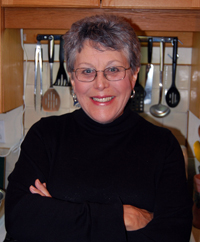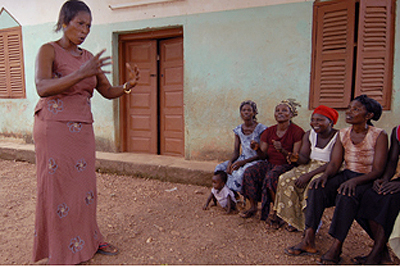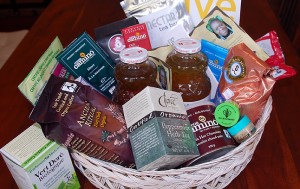
Comfort Kumeah is a cocoa farmer in Mim, Ghana. She is also a mother of five, a kindergarten teacher with 128 students in her class, and a board member of Kuapa Kokoo, an agricultural co-operative that grows, packages, trades and exports cocoa. Kuapa Kokoo is also a shareholder in a U.S. company called Divine Chocolate, which buys Fair Trade cocoa from Kuapa Kokoo. In February, 2007, Kumeah held spellbound an audience of well-dressed Washington DC investors and culinary experts as she explained the difference Fair Trade had made to her village in the Ashanti region of Ghana.
“Before we set-up Kuapa there was a lot of inequity in how we sold our cocoa,” Kumeah said, including sharp practices by buyers. “No one had a

say.”
She went on to explain that at one time, there was only one buyer of cocoa, the government agent. Fraud was rampant, prices were controlled by one body, and farmers often received very poor prices for their products, according to Sojourner’s Magazine, May, 2007.
New regulations finally opened the market to outside buyers. Kuapa Kokoo was set up with the help of advisors who had experience in coffee co-operatives. “Now,” she said, “everything is transparent.” Women are equal partners in farming operations and in running the co-operative.
Kuapa Kokoo produces about 1% of all the cocoa in the world. Because of Fair Trade buyers who guarantee cocoa prices, many changes have occurred in Kapua Kokoo villages. These include sanitation, medical clinics, school for all children, higher rates of democratic participation in village and co-op politics, and a lowered rate of infant mortality.
The downside is that Kuapa Kokoo can sell only about 2 to 4 per cent of its production to Fair Trade organizations. The demand just isn’t there. It’s tough to beat the lower prices (and lower costs from farmer to supermarket) of giant producers such as Nestlé and Kraft.
The rest of Kapua Kokoo’s production—over 95%–must be sold to major manufacturers of chocolate—at lower prices than Fair Trade buyers offer.
The only way organizations such as Kapua Kokoo can improve their market share is if consumers globally increase the demand for Fair Trade products.
Fair Trade certification means that poor farmers in developing and third world countries have a chance at some measure of economic and social stability.
Consumer demand means that large chocolate producers may follow the lead of one of the world’s oldest brands—Cadbury—in its move to a phased introduction of Fair Trade products.
In other words—yes, you can make a difference by buying Fair Trade products.
What exactly does a Fair Trade label mean? TransFair Canada (www.transfair.ca) is the certification agency, and its Fair Trade designation and logo shows agricultural and marketing practices that
- create opportunities for sustainable incomes
- respect fairness of trade through transparency and accountability
- engage capacity building to encourage independent producers’ success
- endorse honest, ethical advertising and high standards in packaging and transportation
- give fair prices, negotiated with all participants in sales and production
- embrace gender equity in production and marketing practices
- insist on disclosure of child labour practices, and respect for UN Rights of the Child
- encourage a healthy environmental practices
- do not exploit small producers
- strive for social and environmental sustainability
You can meet more farmers like Comfort Kumeah at the website for Divine Chocolate: http://www.divinechocolate.com/about/meetfarmers.aspx. The stories are inspiring. (We published another one, about farmers in the Dominican Republic, earlier in the year See Feb. 8 for photo essay.)

Fair Trade Day is coming to Revelstoke on May 8. Several venues are involved — one is the Saturday Community Market on MacKenzie Avenue, another is the Anglican Church where Ten Thousand Villages will set up. Susan Knight is coordinating the event. Scroll down for a list of partners and contributors.
Look for the Revelstoke Current Fair Trade table on Saturday, May 8, at the Community Market. Enjoy a coffee on Talisman Fibre and Trading or a delicious tea thanks to Energy Matters Canada. The kind donors of Fair Trade food products (list below) have helped us put together a big basket of Fair Trade goodies (value over $100) for a raffle. You can buy a ticket for just $1—or a donation of more—with proceeds going to the Revelstoke Food Bank. Everyone who buys a ticket gets to sample a Savage Delights chocolate truffle—while quantities last.
Oh, and don’t forget to bring shoes for Swaziland.
FAIR TRADE SUPPORTERS ON MAY 8
Bear Aware
Castle Joe Books
Chantilly Kitchen Bed N Bath
Cooper’s Foods
Energy Matters Canada
Grizzly Books & Serendipity Shop
Jus Juiced Café
Mountain Goodness Natural Foods
Pharmasave
PT Farm Market
Revelstoke Child Care Resources, with activities for children
Revelstoke Fair Trade
Revelstoke Government Liquor Store
Revelstoke Museum and Archives
Savage Delights and The Revelstoke Current
Screen Smart
Shoes for Swaziland
Talisman Fibre and Trading
The Modern Bakery



